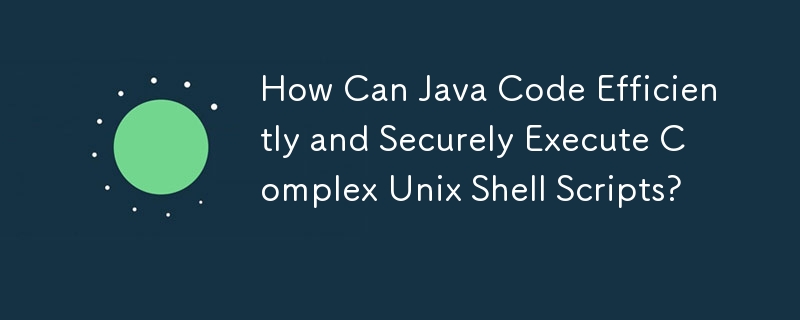 Java
Java
 javaTutorial
javaTutorial
 How Can Java Code Efficiently and Securely Execute Complex Unix Shell Scripts?
How Can Java Code Efficiently and Securely Execute Complex Unix Shell Scripts?
How Can Java Code Efficiently and Securely Execute Complex Unix Shell Scripts?

Running Unix Shell Scripts with Java: A Comprehensive Guide
Executing Unix commands from Java is a straightforward process, as demonstrated by the common approach using Runtime.getRuntime().exec(myCommand). However, the question arises: can we go beyond basic commands and run complex Unix shell scripts from within Java code?
Using Process Builder for Shell Script Execution
The answer is a resounding yes! For this task, the recommended approach is to leverage the ProcessBuilder class. It provides a more versatile and feature-rich interface for managing and executing processes. Here's a detailed breakdown of how ProcessBuilder can be used:
- Creating the ProcessBuilder: Start by constructing a ProcessBuilder instance, passing the shell script name as the first argument and any additional arguments as subsequent parameters.
- Environment Configuration: To customize the execution environment, utilize the environment() method. This allows you to define and modify environment variables, ensuring the script has access to necessary data.
- Directory Selection: Specify the working directory for the script using directory(new File("myDir")). This determines the context in which the script will be executed.
- Process Initialization: Finally, invoke start() on the ProcessBuilder. This initiates the shell script's execution, returning a Process object that represents the newly created process.
Is it Good Practice to Run Shell Scripts from Java?
While running shell scripts from Java is technically feasible, it may not always be the most prudent approach. Here are a few factors to consider:
- Security Concerns: Shell scripts have much broader capabilities than simple commands, potentially introducing security risks.
- Maintenance Challenges: Shell scripts can be difficult to maintain and debug, especially when called from within Java code.
- Portability Limitations: Shell scripts may not be portable across different operating systems, making them less than ideal for cross-platform applications.
Alternative Approaches
In cases where running shell scripts is necessary, consider using wrapper applications or interfacing with the system directly through native methods. These approaches offer a more controlled and secure environment for executing scripts. Additionally, explore specialized libraries designed for managing processes and subprocesses in Java.
The above is the detailed content of How Can Java Code Efficiently and Securely Execute Complex Unix Shell Scripts?. For more information, please follow other related articles on the PHP Chinese website!

Hot AI Tools

Undresser.AI Undress
AI-powered app for creating realistic nude photos

AI Clothes Remover
Online AI tool for removing clothes from photos.

Undress AI Tool
Undress images for free

Clothoff.io
AI clothes remover

AI Hentai Generator
Generate AI Hentai for free.

Hot Article

Hot Tools

Notepad++7.3.1
Easy-to-use and free code editor

SublimeText3 Chinese version
Chinese version, very easy to use

Zend Studio 13.0.1
Powerful PHP integrated development environment

Dreamweaver CS6
Visual web development tools

SublimeText3 Mac version
God-level code editing software (SublimeText3)

Hot Topics
 1376
1376
 52
52
 How does Java's classloading mechanism work, including different classloaders and their delegation models?
Mar 17, 2025 pm 05:35 PM
How does Java's classloading mechanism work, including different classloaders and their delegation models?
Mar 17, 2025 pm 05:35 PM
Java's classloading involves loading, linking, and initializing classes using a hierarchical system with Bootstrap, Extension, and Application classloaders. The parent delegation model ensures core classes are loaded first, affecting custom class loa
 How do I implement multi-level caching in Java applications using libraries like Caffeine or Guava Cache?
Mar 17, 2025 pm 05:44 PM
How do I implement multi-level caching in Java applications using libraries like Caffeine or Guava Cache?
Mar 17, 2025 pm 05:44 PM
The article discusses implementing multi-level caching in Java using Caffeine and Guava Cache to enhance application performance. It covers setup, integration, and performance benefits, along with configuration and eviction policy management best pra
 How can I use JPA (Java Persistence API) for object-relational mapping with advanced features like caching and lazy loading?
Mar 17, 2025 pm 05:43 PM
How can I use JPA (Java Persistence API) for object-relational mapping with advanced features like caching and lazy loading?
Mar 17, 2025 pm 05:43 PM
The article discusses using JPA for object-relational mapping with advanced features like caching and lazy loading. It covers setup, entity mapping, and best practices for optimizing performance while highlighting potential pitfalls.[159 characters]
 How do I use Maven or Gradle for advanced Java project management, build automation, and dependency resolution?
Mar 17, 2025 pm 05:46 PM
How do I use Maven or Gradle for advanced Java project management, build automation, and dependency resolution?
Mar 17, 2025 pm 05:46 PM
The article discusses using Maven and Gradle for Java project management, build automation, and dependency resolution, comparing their approaches and optimization strategies.
 How do I create and use custom Java libraries (JAR files) with proper versioning and dependency management?
Mar 17, 2025 pm 05:45 PM
How do I create and use custom Java libraries (JAR files) with proper versioning and dependency management?
Mar 17, 2025 pm 05:45 PM
The article discusses creating and using custom Java libraries (JAR files) with proper versioning and dependency management, using tools like Maven and Gradle.



